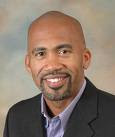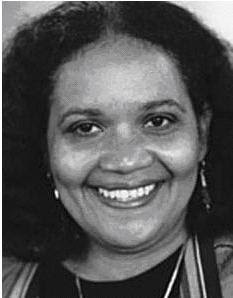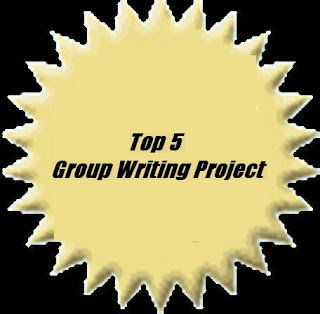 Kyra E. Hicks
Kyra E. Hicks taught herself to quilt after visiting a museum exhibit of African American story quilts in 1991. Her quilts have been shown in such prestigious venues as the American Folk Art Museum in New York, the Smithsonian Institution’s Renwick Gallery in Washington DC, the Museum of Science and Industry in Chicago, and the Wadsworth Atheneum in Hartford. One of her quilts is included in the Permanent Collection of the Museum of Arts & Design in New York City.
Kyra’s story quilts have been featured in several books, including Textural Rhythms: Quilting the Jazz Tradition by Carolyn Mazloomi (2007), Creating Black Americans by Nell Irvin Painter (2005), and American Quiltmaking 1970 – 2000 by Eleanor Levie (2004). Kyra’s essay, “Black Women Have Always Quilted,” appears in Elise Schebler Roberts book The Quilt: A History and Celebration of an American Art Form (2007).
Kyra holds an MBA from the University of Michigan, a diploma from the London School of Economics and Political Science, and a BBA from Howard University. Kyra is a marketing professional. She has worked in marketing and ecommerce for major corporations including America Online, Washingtonpost.com, and Hallmark Cards. Currently, she is the Director, Online Sales Programs at Marriott International.
1. After viewing Eva Ungar Grudin’s traveling exhibition, “Stitching Memories: African-American Story Quilts,” you said, “I found my voice that afternoon in the museum.” How did that epiphany change your life?
Geoffrey, I couldn’t imagine that the 1991 quilting exhibit I was about to visit at the Taft Museum in Cincinnati, Ohio would indeed change my life. I had never made a quilt. There was no way to know that my quilts would one day be exhibited in museums and galleries. There was no way to know that I would write Black Threads: An African American Quilting Sourcebook, the most comprehensive sourcebook on the topic. Or that I would write a children’s book, Martha Ann’s Quilt for Queen Victoria, about a nineteenth century African American quilter named Martha Ann Ricks.
2. What was the biggest challenge in telling Martha Ann’s story?
First, let me tell you about the greatest joy. It was the actual research of Martha Ann Ricks’s life as a slave in Tennessee and of her journey and life in Liberia. I learned about her life from a simple magazine article. I then spent about four years following endless threads to recreate her life. I read many, many books and articles about nineteenth century Liberia and East Tennessee.
Martha Ann Ricks’ father purchased her and her family from slavery and took the family to Liberia in 1830. Unfortunately, within the year, malaria and other events led to the death of all her family members except her oldest and youngest brothers. The three children stayed in Liberia. Over time, Martha Ann would observe the British Navy patrolling the coast of Liberia (and Sierra Leone) to prevent slavers from landing and capturing people for the slave trade. Martha Ann wanted to thank Queen Victoria for sending the Navy. Despite ridicule by family and neighbors, Martha Ann pursued her dream to see Queen Victoria for fifty years. In 1892, Martha Ann Ricks had an audience with Queen Victoria at Windsor Castle, where she presented the queen with a handmade quilt of a coffee tree in full-bloom.
The greatest challenge in writing the children’s book was to indeed learn how to write a children’s book! My goal was to stay true to Martha Ann’s story, while having her story span from childhood to old age when she finally meets the queen. I also wanted to provide a context of why Liberia was so important to African Americans in the 1800s. When we learn about American slavery, we rarely learn about the Liberian connections.
3. Do you see any similarities between your life and Martha Ann’s?
I would love to have met Martha Ann Ricks in real life and spent an afternoon quilting with her. Here was a creative, determined black woman. Can you imagine? She designed a quilt to highlight the coffee tree, one of the most important cash crops at the time. She saved enough money to afford a voyage across the ocean. She actually set out to meet one of the most powerful women on Earth at the time. What Martha Ann accomplished was like a young, poor girl today in San Pablo, Brazil telling her friends she is going to go to Chicago and see and talk to Oprah Winfrey at Harpo Studios. Who would believe the young girl?
I can only hope that Martha Ann and I share a creative vision related to quilting and a determination to accomplish our dreams.
4. Although Martha Ann’s Quilt for Queen Victoria is a children’s book, what do you think older readers and parents will learn from it?
There are a number of themes that both older readers, parents, and social studies teachers can learn from: believing in one’s self, saving for one’s dream, pursuing one’s dream, honoring one’s creative talents.
I visited PS76 in Harlem earlier this year to visit with 4th and 5th graders who read the book. What marvelous questions and comments the boys and girls had about Martha Ann and her story! Several of the students were from outside of the US and could identify with Martha Ann’s travels to start a life in a new country. I have a free book discussion guide for the book at www.BlackThreads.com for parents and teachers.
5. Is there a connection between quilting and the African-American experience?
Black men and women have been quilting in American for more than two hundred years! I have a blog to capture today’s news, exhibits, and profiles of black quilters at www.BlackThreads.blogspot.com. Do come visit!
What makes you laugh?
I love wit. I’m embarrassed to say, but I love laughing along with the British Comedies on PBS – shows such as Are You Being Served?, The Vicar Of Dibley, and Desmond’s (the comedy about a West Indian family).
 Martha Ann’s Quilt for Queen Victoria
Martha Ann’s Quilt for Queen Victoria
Brown Books, 2007, ISBN 978-1-933285-59-7
$16.95 US retail
Book Guide: African American Quilting News
 Many people use the terms “West Indian” and “Caribbean” interchangeably. Yet the question still remains, is there a distinction between the terms “West Indian” and “Caribbean”? Living Guyana thinks it’s “mere semantics”, while Wade uses the terms interchangeably: “Logically I know that Cuba, Haiti, Dominican Republic, Guadeloupe, and Martinique are Caribbean,” he says. “Caribbean primarily means English-speaking, Caribbean Basin country, but I include Bahamas and Belize in there although they are not really a part of the Caribbean Basin.”
Many people use the terms “West Indian” and “Caribbean” interchangeably. Yet the question still remains, is there a distinction between the terms “West Indian” and “Caribbean”? Living Guyana thinks it’s “mere semantics”, while Wade uses the terms interchangeably: “Logically I know that Cuba, Haiti, Dominican Republic, Guadeloupe, and Martinique are Caribbean,” he says. “Caribbean primarily means English-speaking, Caribbean Basin country, but I include Bahamas and Belize in there although they are not really a part of the Caribbean Basin.” 















